6. The Root of what Makes Video Games Fun
I wonder why a game design created over 25 years ago is still so much fun today?
I think that the basic elements that make games fun or exciting don’t change regardless of how many years have passed. However, as games have gotten more and more complicated and sometimes lost sight of simple fun experiences, I think a game like this feels even fresher. Things that are fun are still fun no matter how much time passes.
What do you think, Wada-san?
I think this is because boxing is a very easy sport to understand. The rules are very simple - you thump your opponent and the person who knocks the other person down wins. With a structure that simple, I think even people who have not played the old games will find it very fresh.
Tanabe-san just mentioned that story about NOA and I think that most of those people are young and have never experienced the old Punch-Out!! Do you think that the reason they have enjoyed it was because they enjoyed the memory game aspect, which this game had opened up the genre for?
Probably. The basic reasoning of the game is very clear. For example, in an FPS17, there may be some elements of memorisation, but playing in a battlefield is simply a matter of surviving the attacks from various people. Then, you have something like Super Mario, which has completely different elements and it is just a matter of how to pass by characters who are just moving around on their own. 17 FPS: An abbreviation of first person shooter. A shooting game that takes place from the perspective of the main character.
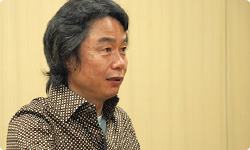
(laughs)
The other characters aren’t aware that Mario is coming. They are just going about, minding their own business, and they suddenly become his opponent.
(laughter)
Memorisation games, however, have clear rules that are easy to understand. They have tactics and they show well defined game elements, so even though they are video games too, the way they are played is completely different. The game design of PUNCH-OUT!! is very well defined and it pares the fun of a game down to just its core, so it is probably suited for this era in which everyone says they don’t have time.
That’s why if we could have them try it...
They will immediately understand why it’s good.
It has a wide range of things that can be enjoyed.
That’s true, but the bar is definitely raised as you progress in the game.
What do you think, Takeda-san?
I felt this when I made the arcade game. At the time I had worked hard on directing the game, like how the opponent would do this and that, but the cash box filled up with a lot of coins.
A lot of people put in their coins and played the game.
What I suddenly understood at the time was the reason the customers put in their coins was not for a realistic interpretation of boxing, but because they were attracted to the root of the sport. This is similar to what Wada-san just said, but everyone knows about boxing and I think it is something that many people know well, but a sport they probably haven’t participated in. The excitement felt when showering an opponent with blows and knocking him down to the floor is the real thing. I think the biggest reason the game was appreciated was the basic allure of boxing.
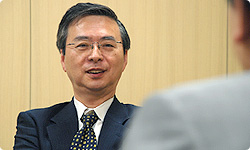
So the biggest reason for the success was that you chose boxing, a decision derived from a proposition to use two televisions and a substrate that could only display one large person then?
I think so.
So finally, I would like to have each of our guests make a comment. Let’s start with Wada-san.
This is the first time a Punch-Out!! game is being sold in a package in Japan in 22 years.
Are you jealous because it is in a package?
Yes. A little bit. (laughs)
(laughter)
I think this game is more within reach for customers than before. So I would like it if they could pick up this game and experience the roots of what makes video games entertaining. This is mostly patterned on the NES version, so I can guarantee that it’s fun.
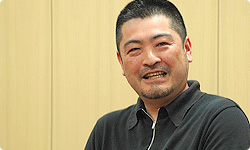
Okay. Tanabe-san.
Over 22 years have passed, so I think many of the people who enjoyed the NES version are now fathers. If you can remember the tricks, you can easily win the first match and impress your child. I would be happy if you played the multiplayer mode with your kids.
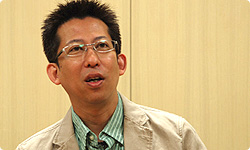
This game was released two months ago in America (May 2009) and it is selling at a steady pace from week to week. I have heard from people at NOA that people who used to play this game on the NES are now fathers and are playing it with their sons. Okay, Miyamoto-san.
Now, when young game designers make games and they are not fun, they add a lot of new material to try and make it fun. Even though they should make the game more fun using what they have right in front of them, they bring in new stuff.
They add more and more new material and try and draw out some fun.
They add more and more. This has been the recent trend in game design. But it looks like they made this version of Punch-Out!! by going back to the basics of game design. However, I think it is an easy game to understand, so I ask mothers to ignore any game allergy and give it a try if there is a Wii nearby. I think mums will find it exhilarating too.
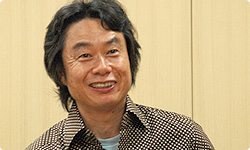
So finally, Takeda-san please.
I would like it if not only people who played the arcade or NES versions in the past, but if new people would also give the game a try and experience the fun of boxing.
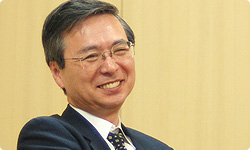
I will make the last comment then. I think this game will be very fun for people trying it for the first time as well as people who played the game before in the arcades or on the NES or Super Nintendo. On the other hand, this game was born in an era when video games were more compact and this product brings the design back in a modern style. The game design is very simple, but people get drawn into it and want to play it again and again. That’s why I would like people who have been playing games for many years to enjoy this interesting structure. There aren’t many games like this being released anymore, so my hope is that people that enjoy this particular type of video game will increase, by even one person, among the people who have been fans of video games for years and those who are new to games.
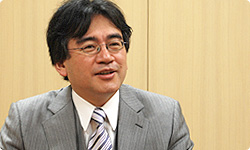
Takeda-san, that’s pretty exciting, isn’t it?
It is.
We can look forward to that, but don’t you think we are going to be getting a lot of requests from the people reading this for Takeda-san to make games again?
(laughter)
Then we will probably be overwhelmed with requests for you to draw more pictures, Miyamoto-san.
I hope not.
(laughter)